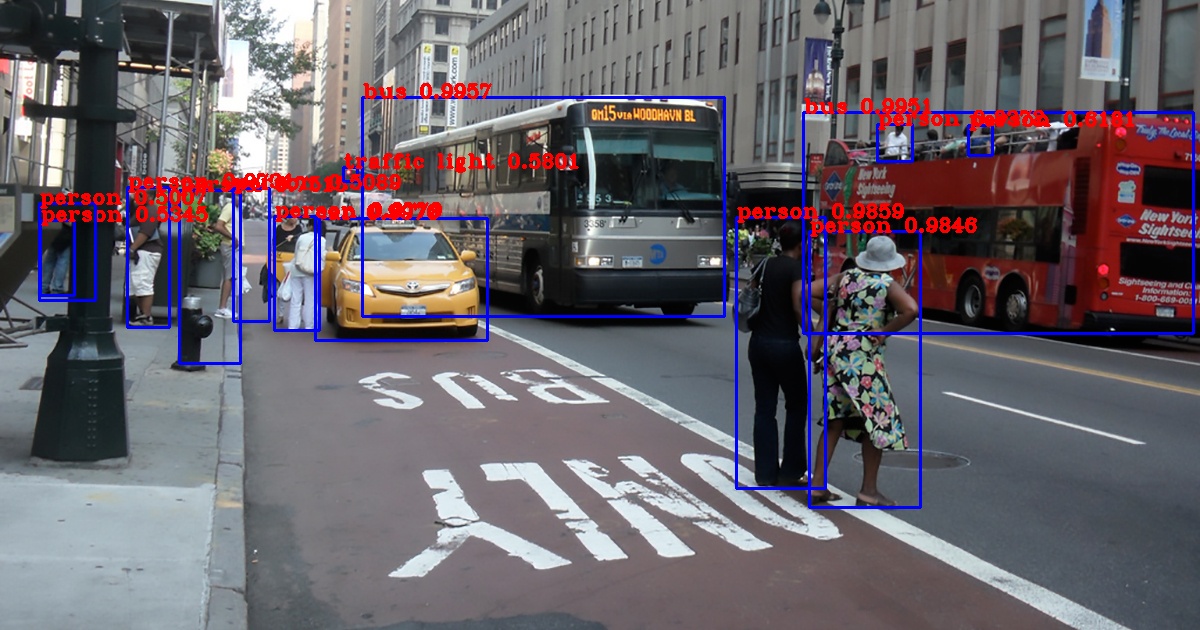

GitHub - zzh8829/yolov3-tf2: YoloV3 Implemented in Tensorflow 2.0
source link: https://github.com/zzh8829/yolov3-tf2
Go to the source link to view the article. You can view the picture content, updated content and better typesetting reading experience. If the link is broken, please click the button below to view the snapshot at that time.
README.md
YoloV3 Implemented in TensorFlow 2.0
This repo provides a clean implementation of YoloV3 in TensorFlow 2.0 using all the best practices.
Key Features
- TensorFlow 2.0
yolov3with pre-trained Weightsyolov3-tinywith pre-trained Weights- Inference example
- Transfer learning example
- Eager mode training with
tf.GradientTape - Graph mode training with
model.fit - Functional model with
tf.keras.layers - Input pipeline using
tf.data - Vectorized transformations
- GPU accelerated
- Fully integrated with
absl-pyfrom abseil.io - Clean implementation
- Following the best practices
- MIT License
Usage
Installation
pip install -r requirements.txt
Convert pre-trained Darknet weights
# yolov3 wget https://pjreddie.com/media/files/yolov3.weights -O data/yolov3.weights python convert.py # yolov3-tiny wget https://pjreddie.com/media/files/yolov3-tiny.weights -O data/yolov3-tiny.weights python convert.py --weights ./data/yolov3-tiny.weights --output ./checkpoints/yolov3-tiny.tf --tiny
Detection
# yolov3 python detect.py --image ./data/meme.jpg # yolov3-tiny python detect.py --weights ./checkpoints/yolov3-tiny.tf --tiny --image ./data/street.jpg
Training
You need to generate tfrecord following the TensorFlow Object Detection API. For example you can use Microsoft VOTT to generate such dataset. You can also use this script to create the pascal voc dataset.
python train.py --batch_size 8 --dataset ~/Data/voc2012.tfrecord --val_dataset ~/Data/voc2012_val.tfrecord --epochs 100 --mode eager_tf --transfer fine_tune python train.py --batch_size 8 --dataset ~/Data/voc2012.tfrecord --val_dataset ~/Data/voc2012_val.tfrecord --epochs 100 --mode fit --transfer none python train.py --batch_size 8 --dataset ~/Data/voc2012.tfrecord --val_dataset ~/Data/voc2012_val.tfrecord --epochs 100 --mode fit --transfer no_output python train.py --batch_size 8 --dataset ~/Data/voc2012.tfrecord --val_dataset ~/Data/voc2012_val.tfrecord --epochs 10 --mode eager_fit --transfer fine_tune --weights ./checkpoints/yolov3-tiny.tf --tiny
Implementation Details
Eager execution
Great addition for existing TensorFlow experts. Not very easy to use without some intermediate understanding of TensorFlow graphs. It is annoying when you accidentally use incompatible features like tensor.shape[0] or some sort of python control flow that works fine in eager mode, but totally breaks down when you try to compile the model to graph.
GradientTape
Extremely useful for debugging purpose, you can set breakpoints anywhere.
You can compile all the keras fitting functionalities with gradient tape using the
run_eagerly argument in model.compile. From my limited testing, GradientTape is
definitely a bit slower than the normal graph mode. So I recommend eager GradientTape
for debugging and graph mode for real training.
@tf.function
@tf.function is very cool. It's like an in-between version of eager and graph. You can step through the function by disabling tf.function and then gain performance when you enable it in production.
absl.py (abseil)
Absolutely amazing. If you don't know already, absl.py is officially used by internal projects at Google. It standardizes application interface for Python and many other languages. After using it within Google, I was so excited to hear abseil going open source. It includes many decades of best practices learned from creating large size scalable applications. I literally have nothing bad to say about it, strongly recommend absl.py to everybody.
Loading pre-trained Darknet weights
very hard with pure functional API because the layer ordering is different in tf.keras and darknet. The clean solution here is creating sub-models in keras. Keras is not able to save nested model in h5 format properly, TF Checkpoint is recommended since its offically supported by TensorFlow.
tf.keras.layers.BatchNormalization
It doesn't work very well for transfer learning. There are many articles and github issues all over the internet. I used a simple hack to make it work nicer on transfer learning with small batches.
Command Line Args Reference
convert.py:
--output: path to output
(default: './checkpoints/yolov3.tf')
--[no]tiny: yolov3 or yolov3-tiny
(default: 'false')
--weights: path to weights file
(default: './data/yolov3.weights')
detect.py:
--classes: path to classes file
(default: './data/coco.names')
--image: path to input image
(default: './data/girl.png')
--output: path to output image
(default: './output.jpg')
--[no]tiny: yolov3 or yolov3-tiny
(default: 'false')
--weights: path to weights file
(default: './checkpoints/yolov3.tf')
--batch_size: batch size
(default: '8')
(an integer)
--classes: path to classes file
(default: './data/coco.names')
--dataset: path to dataset
(default: '')
--epochs: number of epochs
(default: '2')
(an integer)
--learning_rate: learning rate
(default: '0.001')
(a number)
--mode: <fit|eager_fit|eager_tf>: fit: model.fit, eager_fit: model.fit(run_eagerly=True), eager_tf: custom GradientTape
(default: 'fit')
--size: image size
(default: '416')
(an integer)
--[no]tiny: yolov3 or yolov3-tiny
(default: 'false')
--transfer: <none|darknet|no_output|frozen|fine_tune>: none: Training from scratch, darknet: Transfer darknet, no_output: Transfer all but output, frozen: Transfer and
freeze all, fine_tune: Transfer all and freeze darknet only
(default: 'none')
--val_dataset: path to validation dataset
(default: '')
--weights: path to weights file
(default: './checkpoints/yolov3.tf')References
It is pretty much impossible to implement this from the yolov3 paper alone. I had to reference the official (very hard to understand) and many un-official (many minor errors) repos to piece together the complete picture.
- https://github.com/pjreddie/darknet
- official yolov3 implementation
- https://github.com/AlexeyAB
- explinations of parameters
- https://github.com/qqwweee/keras-yolo3
- models
- loss functions
- https://github.com/YunYang1994/tensorflow-yolov3
- data transformations
- loss functions
- https://github.com/ayooshkathuria/pytorch-yolo-v3
- models
- https://github.com/broadinstitute/keras-resnet
- batch normalization fix
Recommend
About Joyk
Aggregate valuable and interesting links.
Joyk means Joy of geeK

